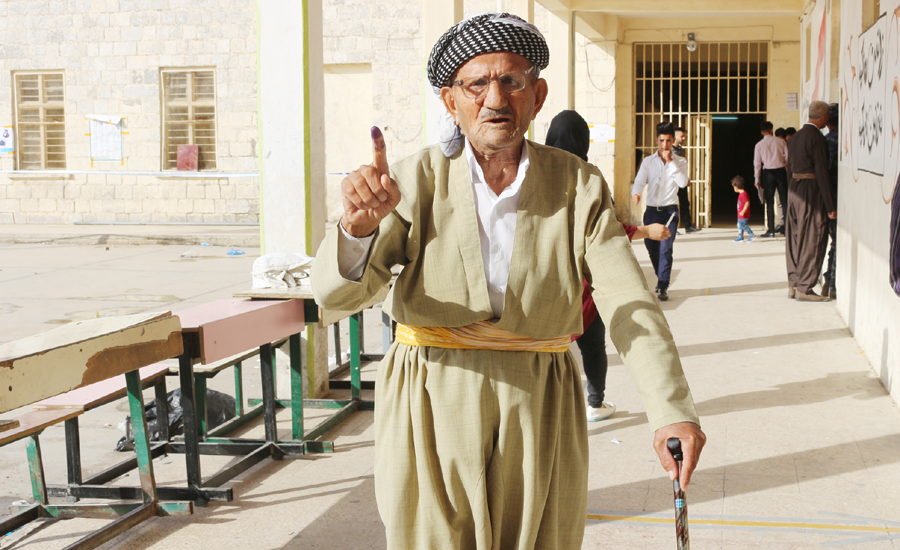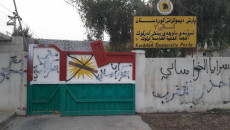Heat debate is ongoing among the Iraqi Kurdish parties in Kirkuk to form an umbrella list that gathers all for the upcoming parliamentary elections in October 2021. The leading parties call on the smaller parties to join them and the smaller parties want to play roles.
Their unanimous agreement is almost an impossible mission as there are several options and none of it satisfies the ambitions of all the parties at the same time. Though they have not determined the structure of the list, they are discussing technical issues of name of list, logo and slogans. Tens of meetings have been held and few steps taken forward.
The new electoral law ratified last November, a key demand of demonstrators in 2019, changes each of the country’s 18 provinces into several electoral districts in order to prevent parties from running on unified lists, which has in the past helped them easily take all the seats in a specific province. Instead, the seats would go to whoever gets the most votes in the electoral districts.
The 329-member house of representatives was elected in May 2018. The vote is held every four years, but the protesters have been demanding early elections. Kirkuk northern province is divided into three electoral districts for 12 seats.
Multiple options and little hope
The Patriotic Union of Kurdistan PUK led by co-presidents Bafl Talabani and Lahoor shex Jangi is the leading Kurdish party in Kirkuk since 2005. PUK has got 6 out of 12 seats of Kirkuk portion in Iraqi parliament elections of 2013 and 2018.
According to sources from PUK and other Kurdish parties in Kirkuk, PUK urges other Kurdish parties to join “the unified Kurdish list” in Kirkuk and urge their voters to vote for the list but have no candidate. In return, after parliamentary elections, PUK will share administrative positions of Kirkuk with them. The other Kurdish parties rejected PUK offer.
As Kirkuk has three electoral districts, PUK puts forward another scenario of PUK candidates run for the district where Kurdish community is based in order to win all the five seats there. In return, small parties can run in the other two districts. The rivals of PUK believe this option have minimalist hope of agreement.
“We want to have candidates in the three districts while KDP suggests to have candidate only in the Kurdish dominant area district,” Hasan Shekhani, senior member of Kurdistan Islamic Movement IMK in Kirkuk, said.
“We want to have candidates in the three districts while KDP suggests to have candidate only in the Kurdish dominant area district,” Hasan Shekhani, senior member of Kurdistan Islamic Movement IMK in Kirkuk, said.
Kurdistan Democratic Party KDP led by Masoud Barzani, headquarters based in Erbil, is one of the leading Kurdish parties in Iraqi Kurdistan regions. It has won only two seats of 12 seats of Kirkuk parliamentary seats in 2013. KDP and PUK run the Kurdistan regional government KRG along with Goran (Change) Movement.
KDP is willing to run for Kirkuk 2021 elections as it has boycotted 2018 parliamentary election in Kirkuk after October 2017 events when Iraqi troops regained control of Kirkuk and disputed territories following ISIS claimed defeat.
In October, 2017, Iraqi troops backed by pro-Shiite militias expelled Kurds from Kirkuk following a referendum to join Kurdistan region held by the Kurdistan Regional Government KRG.
Since then, the KDP suspended all its political activities in Kirkuk province, and most of the officials affiliated with the party who used to occupy governmental, security and administrative positions were displaced to Erbil.
The KDP defines recontroling Kirkuk “occupation” and demands a pact alike Shingal agreement signed in May 2020 between the Erbil and Baghdad for appointment of a new administration, ousting militiamen to be replaced with joint troops to oversee the security all over the province.
11 Kurdish political parties have met in Kirkuk early February. KDP and New Generation (Naway Nwy) have not attended the meeting. Earlier, The Kurdish parties have met in Iraqi Kurdistan parliament with parliament speaker to discuss a unified Kurdish list and the techniques of the new law for 2021 elections.
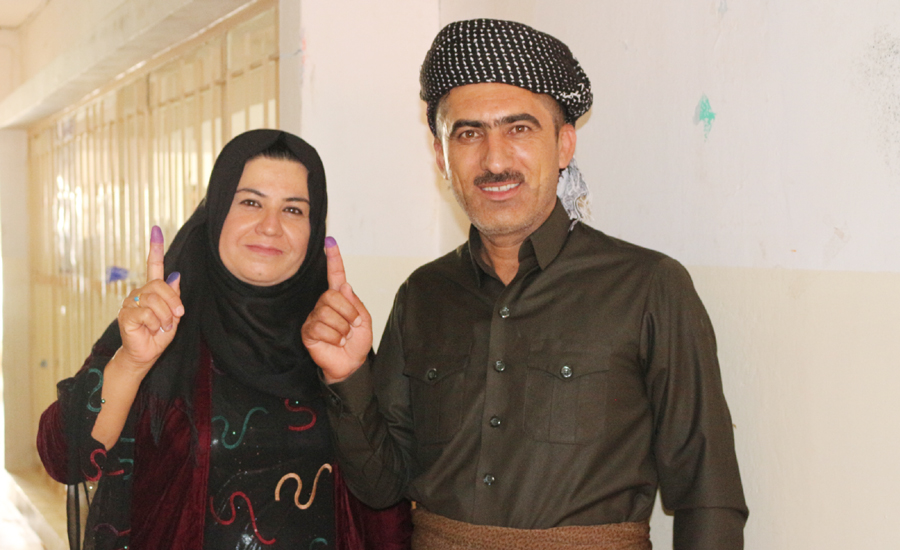
A couple vote in 2018 elections in Kirkuk. Photo by KirkukNow.
“We unanimously agreed that any party joins the list and presents no candidate, it will get admin positions the Kurds will be eligible for in post-election era,” Shekhani said. KirkukNow has been informed that six parties insist to have candidates in the Kurdish list for Kirkuk.
Gorran, Kurdistan Justice Group, Islamic Union of Kurdistan and IMK prefer to have candidate in each district. An attendant of the meeting anonymously told KirkukNow that KDP suggested having two candidates in the Kurdish list for Kirkuk but PUK has refused the proposal.
The Kurds want to get the full five seats in the first electoral district of Kirkuk as the area is Kurdish population dominant. They aim at 2 out of 4 seats of the second mix electoral district. The third Arab dominant district south of Kirkuk is a big challenge for Kurds unless they are unified under one parliamentary bloc.
The oil rich city of Kirkuk, located 238 kilometers north of Baghdad, is an ethnically mixed province of Kurds, Sunni and Shiite Arabs, and Turkmen. It has long been at the center of disputes between Baghdad and the autonomous Kurdistan Regional Government KRG.
The Iraqi independent high electoral commission have extended registration of blocs and coalitions up to February 27th.
An alternate option is to shar the three districts among the Kurdish parties. “The communists to have one candidate, the Islamists another candidate, each in a district and those have no candidate to get admin posts per Kurdish seas after elections,” the anonymous source added.
“The communists to have one candidate, the Islamists another candidate, each in a district and those have no candidate to get admin posts per Kurdish seas after elections,” the anonymous source added.
Others believe that unless PUK and KDP agree, the unified Kurdish list in Kirkuk is an impossible mission. “One list in Kirkuk will not come easily as there is deep disagreement among the two main parties in power KDP and PUK over Kirkuk and one is sure how certain they are about one list in Kirkuk,” another source from one of the Kurdish parties in Kirkuk on condition of anonymity said. “If any one of them withdraw, then few other parties will follow them.”
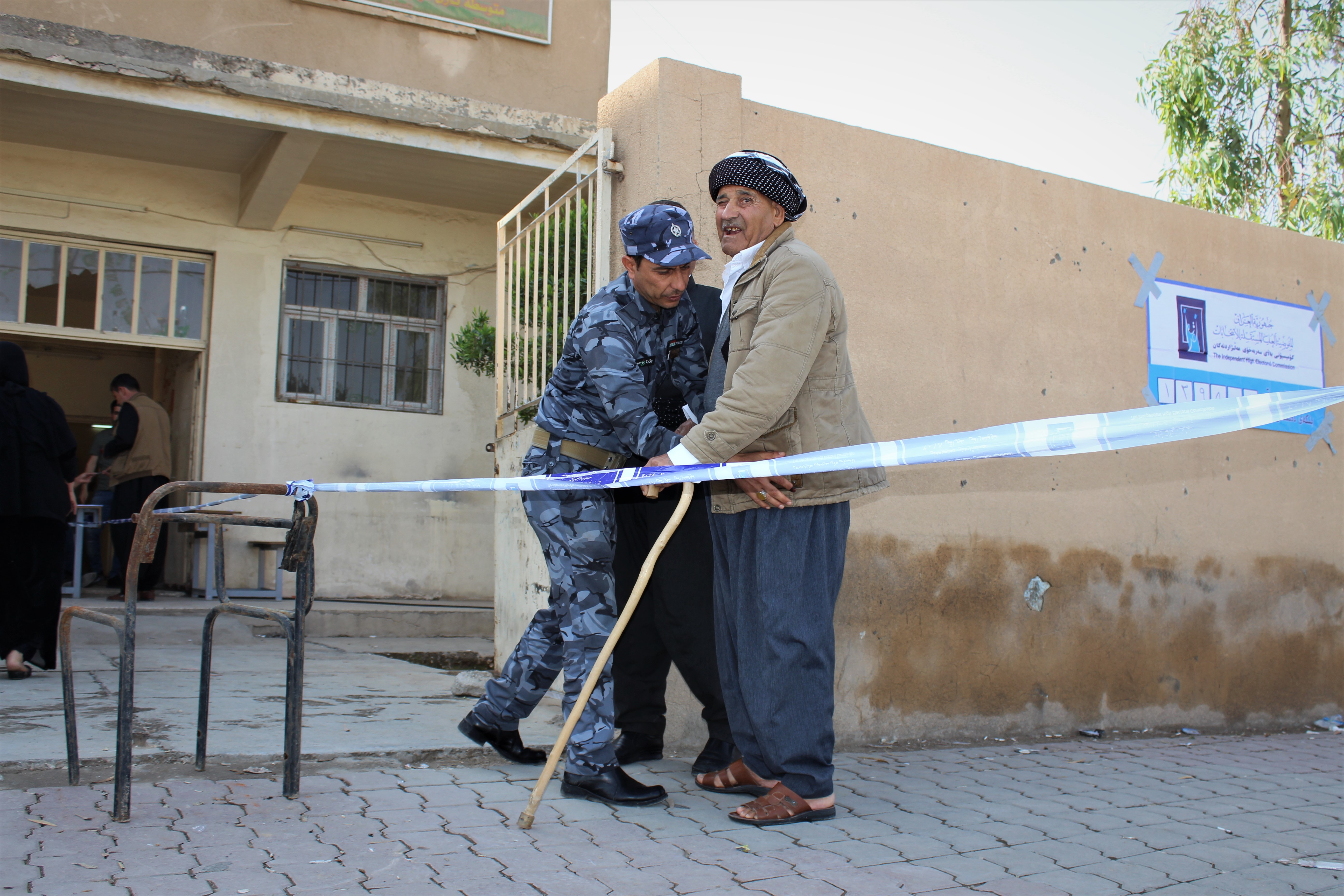
Voter inspected in front of a polling center in Kirkuk in May 2018 elections. Photo by KirkukNow
Disagreement over seats, agreement over technicalities
The PUK and KDP insist on running Kirkuk elections only with their candidates as they have got the main seats in the previous elections. As discussions are ongoing about share of each party in the list, they have come to agreement about the list’s name, logo and slogans.
“We have agreed over name, logo, leader and general lines. Some other points to be agreed upon in order to make a joint list that expresses all the Kurdish parties,” Shekhani added. He did not give any further details.
Political observers think that long history of rivalry between PUK and PUK makes it hard to come to an agreement in Kirkuk.
KDP accuses PUK of collaboration with Baghdad in October 2017 events. In exchange, PUK blames KDP-led referendum has triggered Iraqi government’s assault to gain power in Kirkuk.
Rakan Saeed al-Jiburi, a Sunni Arab has been appointed as acting governor of Kirkuk since October 2017, after the Iraqi parliament sacked former Kurdish governor Najmaddin Karim.
Latif Fatih Faraj, a writer from Kirkuk, said there were many attempts for one list in the past. In 2013 KDP rejected PUK leader of the list. Other parties followed KDP and no unified list was presented. “The dispute among the parties, demands by each party, the 50-50 culture of PUK-KDP and their ego makes other parties frightened of a framework for one list.”
Regarding PUK stand of leading the unified list through its candidates, Faraj said the current situation is different. PUK has got six seats in the past and “thinks still people follow it but may be it is not going to be the same for this election.”
“I don’t think that PUK wants one list and KDP has its own excuses. KDP thinks there was treason in October 16 (2017) and still believes in that slogan. All these are obstacles ahead of unified list, adding complaints of other parties,” he added.
“I don’t think that PUK wants one list and KDP has its own excuses. KDP thinks there was treason in October 16 (2017) and still believes in that slogan. All these are obstacles ahead of unified list, adding complaints of other parties,” he added.
PUK votes has dropped from 210,000 in 2013 into 166,000 in 2018 but kept the six parliamentary seats. KDP has got 63,000 in 2013 and got 2 seats.
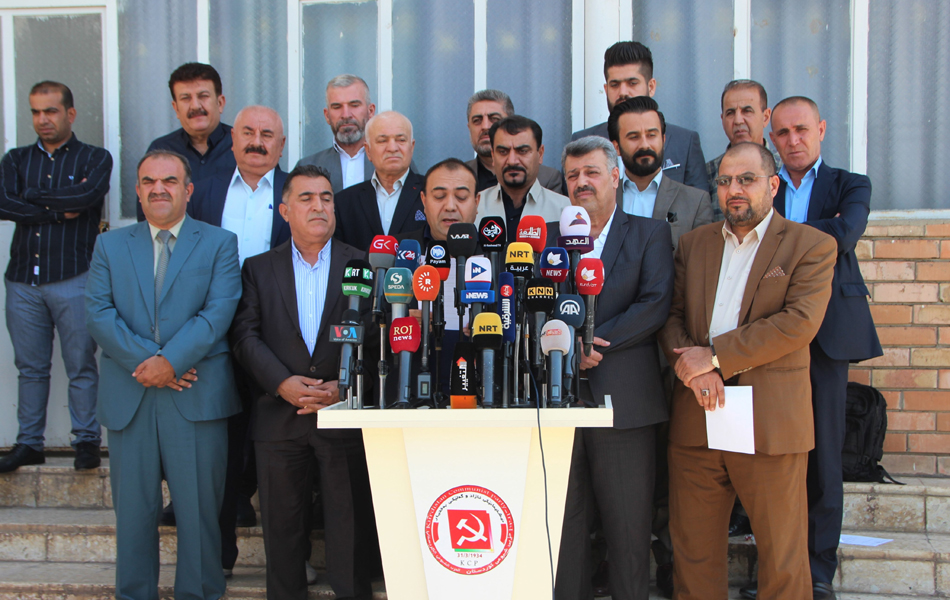
Press conference for Kurdish parties in Kirkuk about unified Kurdish list in Sept. 9, 2019. Photo by Karwan Salihi.
Faraj urges Kurdish parties particularly KDP and PUK to form a unified list in all disputed areas not only Kirkuk. “They can run elections with one list in Kirkuk and Mosul and exchange and share votes in order to earn votes for Kurds.”
“It is not fair to call for one list and do not give other parties the chance to candidate their people,” Faraj commented about PUK and KDP proposal for sharing the list with other parties. “(alternatively) They can sign an agreement to involve them in local authorities.”
“It is not fair to call for one list and do not give other parties the chance to candidate their people,” Faraj commented about PUK and KDP proposal for sharing the list with other parties.
Political parties in Kirkuk believe that leaders of the parties have the final say. “There should be a summit for the political parties about Kirkuk unified list,” Shekhani suggested.
“Current electoral law has to be carefully taken into consideration otherwise it will be a loss for the Kurds. If we manage the elections well and wisely, we can earn 7 seats,” Shekhani added. Shekhani thinks a unified Kurdish list can gather 30,000 in the third electoral district in Kirkuk.
The Kurdish street is suspicious of PUK and KDP will to overcome their disputes for nation building steps.
“There are many ways to make an agreement but in general I see one list an impossible option due to previous conflict and prioritizing part interest. I doubt that all come under one list,” Faraj concluded.

